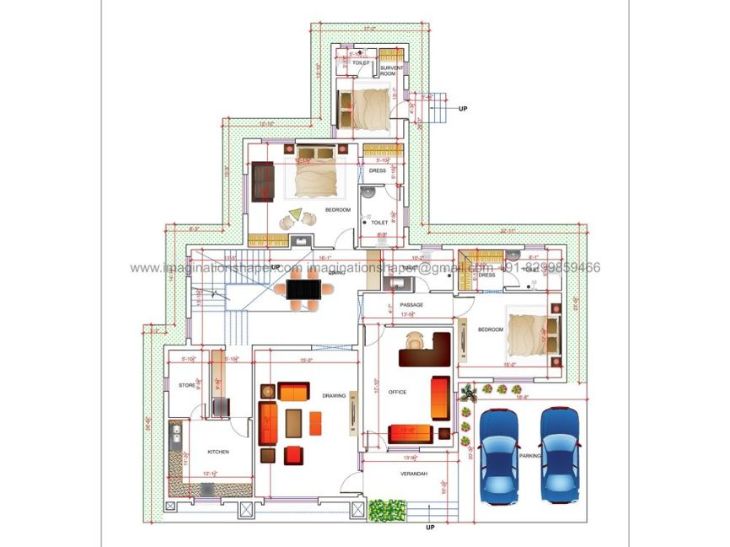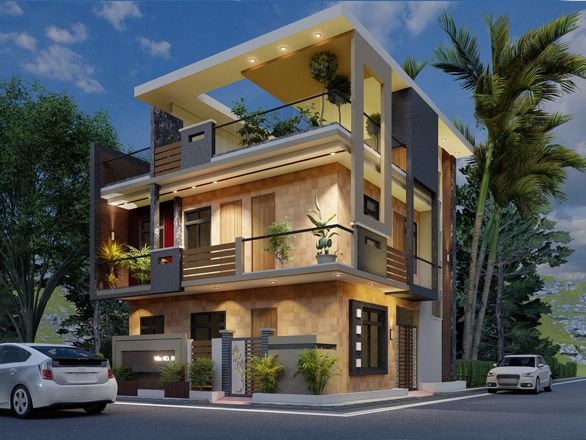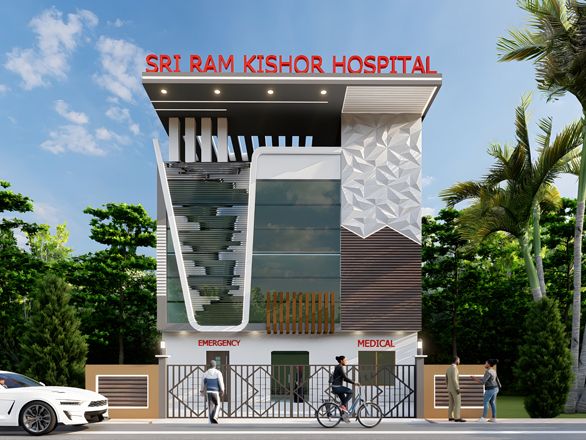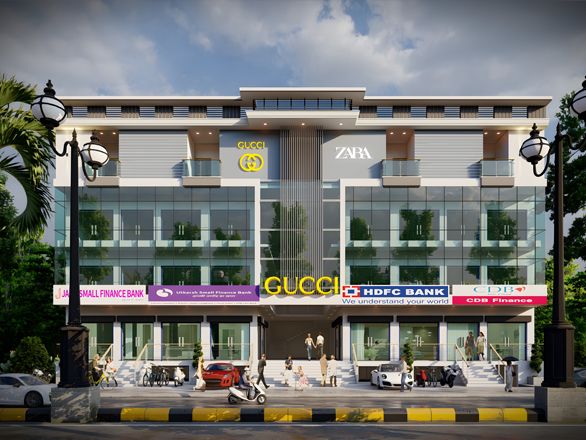Didn't find the right design, get a 100% customized design by our design expert.
Starting from 3999/-
Our Hospital architecture design and planning design service combines precision and inventiveness. Our skilled architects, interior designers, and engineers spent years collecting thousands of Hospital architecture design and planning. Our careful planning ensures practicality and aesthetics combine flawlessly. Look through our projects to see how technology and creativity can work together, and see what possibilities exist for your next project. We hope that these Hospital architecture design and planning collections help find right home quickly. If you need help narrowing down your selections, or would like suggestions based on your criteria, whats app chat, email or call us. We’d be happy to help you find the Hospital architecture design and planning that fits your lifestyle and budget. You can also check out our Specialty Collections or customized design service for more design ideas. Let's build your dream home together from designing to execution.

Get best customized house plan designed by experienced architects and designers.

Are looking for the elevation design services, Imagination would be the perfect option.

Home interior design to enhance the interior of the project services at an affordable price.

Design your health care project as per guidelines, the user and patient-centric also.

We incorporate sustainability strategies, creative space planning and best technology.

We are focused on combining function with style to meet the need of businesses.
• Introduction
• What is a hospital?
• Scope of hospital
• Type of hospital
• Amenities that are required in a Hospital or types of departments in a hospital
• Who is a hospital architect and what is hospital architecture?
• Service offered by the hospital architect.
• Amenities That Are Required In Hospital
• The Full Procedure to design a hospital by the Architect
• Important points that are considered while designing a hospital
• Hospital drawings that are drawn by the healthcare architect
• Who We Are
• How can we help you as a Hospital architect in Hospital architecture design and planning?
• FAQ
The patient who comes to the hospital is stressed, worried and scared; the purpose of the hospital is to make the patient happy and comfortable. Healthy hospital architecture is not able to keep the only patient happy but also for all the doctors, nurses and other staff. Hospital Architects are not the same as residence architects they consider many technical aspects and large requirements and ensure that the spaces are correctly connected useful and infection-free. Florence nightingale was the first lady who understood the basic principle that was Sanitation, infection control and control environment, the theory that was the evidence-based design that is used in the current scenario. Now in the designing phase of the architecture plan hospital architects ensure that building spaces are easy to clean and infection-free and patients feel safe and have the best view from the ward. To control infection and manpower we don’t have to give more than three entrances the first one is the main entrance which people generally use, the second one is emergency and the third is for services.
Hospital is an institute where any sick and injured people are treated and taken care of, hospitals are equipped with many types of diagnostics tools and trained staff (doctors, nurses and other healthcare workers) in order to provide better service to the population.
The main scope of the hospital is to provide the best healthcare service to the population and train healthcare workers. There are some other supporting healthcare roles mentioned below.
• To help the government make healthcare rules by presenting data on healthcare.
• Provide educational services to the medical student.
• Research on health-related issues.
• Employment service to the healthcare workers.
The hospital can be categorized in many ways few important categorizations are mentioned below.
As per objective-
• Academic or research hospital
• General hospital
• Special hospital (Eye hospital, Chest hospital, Dental hospital, Skin hospital, Orthopedic hospital, ENT hospital etc.)
As per size-
• Small
• Medium
• Large
As per ownership-
• Private hospital
• Government hospital
• NGO-owned hospital
There are many departments that are required in the hospital few important are being mentioned below.
• Intensive Care Unit
• Nephrology Department
• Neurology Department
• Cardiology Department
• Obstetrics/Gynecology Department
• Radiology department
• Administrative department
• Central Sterile Supply Department
• Medical Record Department
• Medical department
• Pathology department
• Pharmacy department
• Operation theatre complex
• Orthopedics
• Hematology
Hospital architects are the person who is expert in hospital design architecture and knows, very well about the hospital function, infection control and technical details. The architect’s role in the hospital is very important because they create design considering all technical aspects like structure, and services. Hospital architecture is the planning and technical knowledge that is required to plan a hospital known as hospital architecture.
Hospital architects are responsible for the following services.
• Investors Presentation / Financial Modeling
• Technical Drawings Audit of Proposed Hospital Design
• Existing Hospital Exterior Design and Renovation Services
• 3D View of Hospital Building
• Hospital Mockup Conceptual Design
• 3D Walkthrough or Animation Video of Hospital
• Value Addition Services of Proposed Hospital Design
• Complete Project Design of Hospital
• Hospital Landscape design
• Hospital Elevation Design
• Project Management Consultancy
• Branding, Marketing and Sales
• MEP, Fire plan and essential services
Some important amenities of the hospital are written below.
• Parking
• Blood bank
• Diagnostic/Treatment
• Emergency
• Outpatient Clinics
• Patient Care Units
• Staff toilet
• Public toilet
• Lockers
• Material management store
• CSSD
• Conference room
• Medical records
• Cafeteria
• Administration
• Bio med
• Mortuary
• Nurse station
• Registration/billing
• Radiology
• MRI
• Oxygen manifold
• Dialysis
• Isolation
• Blood bank
• Physiotherapy
• Store
• NICU
• PICU
• ICU
• General ward
Here we are going to explain step-by-step hospital design and planning.
1-Finalize Area Requirement-
Before start designing architecture planning of a hospital, you have to decide what services you are going to provide like O.P.D., Diagnostics, and what services you are going to outsource like biomedical waste management, ct MRI, Cafeteria; on behalf of that built-up area required to plan a hospital between 600-1000sqft per bed. If you need a simple hospital you need a 600sqft built-up area per bed but if you increase the requirement it will go up to 1000 sqft per bed. The mid-range and smooth running hospital required 800sqft per bed built-up area.
2-Selection Of The Site-
The three architectural aspects should be considered while selecting the site hospital building.
I) FSI-
Its value varies between1.5-2 by this we can decide covered area or built-up area of that site by multiplying FSI into plot size. Larger FSI the number better because we can have more construction area.
II) Setback-
Set back is the space between the boundary wall and the building. The setback is decided by regulating authority. It should be sufficient that the fire brigade vehicle easily moves from there it’s about 6m-7m in most cases. This also helps to decide whether the plot is worth purchasing or not, it should not be too linear otherwise it will not good for hospital design architecture.
III) Coverage-
It’s about 50% of the plot area, depending on the regulatory authority.
Note-
Before starting designing ensure that Land use permission is for hospital or commercial land if not contact regulating authority to change land use.
3-Building Selection-
In the case of a conversion project, these things are kept in mind.
• The floor height should be 3.5-4m and good lavish spaces for better operations In OT.
• Ramp and other disabled friend features.
• The entrance and exit should be properly placed.
• Fire safety aspect-
Enough space in the corridor and around the building
Stair-case width.
• Column and beam arrangement should be maximum distance for better planning
Check these points to ensure that their design satisfies the people living and functioning in the space they design.
4-Hospital Specific Design-
The building should follow NBC and NABH, and local bylaws for planning Aerb guidelines for Xray design.
Parking Facility-
If your floor area is up to 3000sqft then 1car 1bike parking is required per 50sqm of covered area.
If your floor area is more than 3000 sqft then1 car and 1 bike parking are required per 75sqm of covered area.
Fire Safety Measures-
Hospitals can easily catch fire due to oxygen running pipeline chemicals and equipment. Many hospital inpatients are disabled so maximum precaution should be followed in hospital architecture design & planning.
The fire safety point is mentioned below.
• Space around the building for fire brigade vehicle movement.
• Escape route display.
• Door width in critical areas.
• Staircase and corridor width.
• Ramp width.
• Fire hydrant and sprinkler system
• The toilet should be disabled-friendly and should have grab bars and other disabled-friendly features doors always should be open outside and a minimum of 900 mm wide.
• The width of the staircase should be 2000mm and the corridor should be 2400 mm wide for safety in case of fire for passing stretchers and wheelchairs.
• OT and CSSD should be in such type general people don’t cross or mix to maintain sterility and make space infection free and the path should be unidirectional. Path sequence to be Dirty corridor-Semi dirty corridor-clean corridor-sterilized zone, and should be unidirectional. And one more important thing the OT light should be shadowless.
• The view from the ward should be beautiful scenery, greenery or something relaxing and also provides pathways inside the park outside. A good greenery view increases the recovery rate of the patient and doesn’t need to take sleeping pills in this case.
• The space for a bed should be a 3m by 3m area so that the family can sit down on a couch or bed which one of them spend the night and provide a nurse station nearby location.
• Small nurses break room and staff lounge for hospital staff for planning hospital-related operations.
• Provide distractions like the aquarium or any painting bright colour sofas mural.
• Hospitals should be Patient-centric and user-centric also so that we can provide a good environment for patients as well as hospital staff also.
• Floor height should be 3.5m-4m for better operations.
• The ramp should be enough width and the slope should be 1:10-1:12.
• Provide Staircase, life and corridor facilities for better movement.
• Infection control measures should be followed during designing, like segregation of critical and non-critical areas, O.T. and CSSD zoning is needed to consider while planning.
• The sanitation station should provide at the required location. Hand wash in the consultation room and scrub station in OT.
• Patient and visitor-centric design.
• A waiting area, Prayer room should be provided.
• Movement should be unidirectional as if we are going to o.t. first we go to dress then scrub station and then OT this sequence should not change otherwise the sequence of the dirty corridor- clean corridor and sterilize corridor will be change
• Grab bar should provide where required.
• Critical and non-critical areas should be properly segregated-CSSD is an important part of the hospital in which scalpels and instruments are clean and sterilized which are used in OT. Zoning is also important in CSSD like O.T., Dirty, clean and sterile and material and staff movement are also important.
The following drawing is drawn by a healthcare architect.
1. Floor planning with furniture layout
2. 3D front elevation design
3. Structure drawing-
• Centerline plan (Layout plan) of all floor columns.
• Excavation drawing
• Foundation and footing detail
• Column detail
• Plinth and slab level beam layout and detail
• Roof plan and detail
• Stairs RCC details
• Boundary wall structure details.
4. Working drawing-
• 2D elevation
• Working plans
• Boundary wall detail
• Toilet 2D details
• Wall details
• Door and window details
• Section drawing
• Staircase details
5. MEP and PHE services
• HVAC Designing
• Telephone Data, UPS
• Nursing Calling System
• Indication System
• Public Address System
• CCTV System
6. Electrical -
• Electrical Layout
• Power Layout
• 9Panel System
• Sub Station Designing
• Cable Routing
• Cable Sizing
• Load Calculation
• DB Detail
• Conducting detail
• Electrical estimate
7. Fire fighting -
• Fire alarm system
• Fire fighting system
• Fire fighting estimate
8. Plumbing -
• Internal plumbing and sanitation
• External sewer water supply system
• STP designing
• Plumbing estimate
We are an Architectural designing firm, that has designed various healthcare projects in India. We are well-introduced to healthcare projects and understand technical aspects very well. We can help clients to design infection-free and functional hospital projects to help the community.
Hospital designing is important to the field in the designing and construction field with the help of nabh and jci, we design a good patient-centric and user-centric hospital. The role of architects in hospitals is to prevent infection and help patients heal faster. An Architect's responsibility is to design hospitals so that the public may get health care spaces that are infection-free, patient and user-centric. We are India-based healthcare designing consultants and have tested processes for infection-free and functional hospital design. Cost and energy use can be deducted by our sustainable design approach.
The use of technology in the design process is crucial to the success of any hospital project. Hospitals are complex structures that must meet a variety of functional requirements, and the use of technology can help to ensure that these requirements are met.
In the early stages of design, architects and engineers use computer-aided design (CAD) software to create a three-dimensional (3D) model of the proposed hospital. This model can be used to assess the feasibility of the project and to identify potential problems.
Once the basic design is complete, further analysis is conducted using Building Information Modelling (BIM) software. BIM allows for a more detailed assessment of the hospital’s layout and can be used to generate accurate construction documents.
During construction, technology is used to monitor progress and ensure that quality standards are met.
The hospital of the future will be a much different place than the hospitals of today. With advances in technology, architecture, and design, hospitals will be able to provide better care for patients while also being more efficient and cost-effective.
1. Smarter Buildings: Hospitals of the future will be equipped with smart technologies that will help to improve patient care and safety. For example, sensors will be used to monitor patients’ vital signs and alert staff if there are any changes.
2. Personalized Medicine: With the help of data collected from wearable devices and electronic health records, hospitals will be able to offer personalized medicine to patients. This means that treatments will be tailored specifically to each individual patient’s needs.
3. Virtual Care: Hospitals will increasingly make use of telemedicine and other virtual care technologies in order to provide care to patients who live far away or who are unable to come to the hospital in person.
4. 3D Printing: Three-dimensional printing technology will be used in hospitals to create custom implants and prosthetics for patients. This could revolutionize the way that many surgeries are performed.
5. Robots: Robots will play an important role in future hospitals, performing tasks such as delivering medications and supplies, checking vital signs, and even providing companionship to patients.
What is the role of architecture in hospital planning?
Role of architecture in hospital planning involves a careful balance of functionality, safety, patient-centered design, and the integration of technology to meet the unique needs of a healthcare facility.
Why is hospital planning important?
Hospital planning is essential for creating healthcare facilities that are efficient, safe, adaptable, and responsive to the needs of patients and the community.

